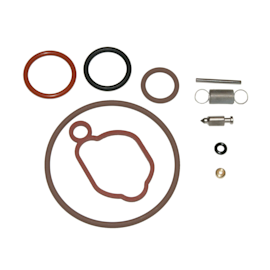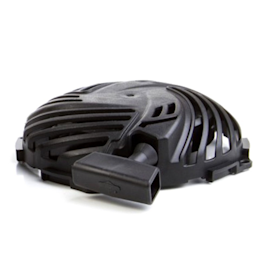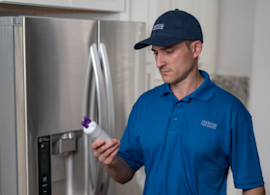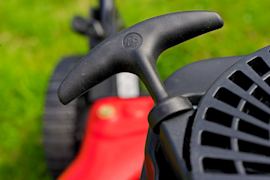Lawn mower won't move troubleshooting video: motion drive failure


If your lawn mower won’t move when you pull the drive control lever, several things could be causing the problem.
In this Sears PartsDirect video, we show you how to check for a broken or disconnected drive control cable, how to examine the drive belt and wheels, and how to rule out a transmission problem. We'll take you through the whole process and help you find out which components need to be repaired so you can get back to mowing your lawn.
Hi, this is Wayne, from PartsDirect. Today we’re going to talk about some troubleshooting steps to determine why your self-propelled lawn mower won’t move when you pull the drive control lever.
Tools and equipment needed
Nut driver set
Slot screwdriver
Needle-nose pliers
Plastic sandwich bag
Socket wrench set
Bungee cord
How the drive system works
Work in a well-ventilated area free of open flame or sparks.
First, let's look at how the drive system works on this front-wheel drive, self-propelled lawn mower.
When you pull up the lever, the drive control cable pivots the transmission forward and tightens the ground drive belt onto the engine and transmission pulleys, causing the transmission pulley to spin, which drives the axle to spin the wheels and move the mower forward.
Let go of the drive control lever, and the transmission pivots back to restore slack in the drive belt. The belt won’t spin the pulley and the mower won’t move.
Now, let's look at what can go wrong.
Drive control cable
A broken or disconnected drive control able won't pivot the transmission. You'll notice a slack drive control lever if you encounter this failure.
Replace the drive control cable if it's broken. Here's a link for a video that shows you how.
If the drive control cable freezes up inside its sheath, you won't be able to pull up the lever and the cable won't pivot the transmission forward to engage the drive belt. Replace the drive control able if it freezes up inside its sheath.
If the cable is still intact and not frozen up, we’ll check the drive control cable connection to the transmission.
Disconnect the spark plug wire.
Remove the fuel tank cap.
Place a plastic sandwich bag over the fuel tank opening and reinstall the fuel tank cap to prevent gasoline from leaking out.
Tilt the mower back to lift the front wheels then secure the mower handle to your worktable to hold the mower steady.
Remove the bottom mounting screws for the drive cover.
Release the mower handle and lower the mower to the upright position.
Remove the drive cover top mounting screws.
Release the height adjuster lever and pull the drive cover off.
Reconnect the drive control cable to the anchor post if it's disconnected. If the anchor post is broken, you'll need to replace the front deck tray. Here's a video that shows you how.
Drive belt
The drive belt rarely fails but a worn or broken drive belt won't engage the engine pulley and spin the transmission pulley. Check the drive belt and replace it if it's worn or broken. Here's a link for a repair video that shows how to replace the drive belt.
Drive wheels
Next, we'll check the drive wheels. Pry off the hubcaps and then remove the wheel nuts. Pull both wheels off the front axle.
Clean debris out of the wheel gears.
Check the plastic gears inside the drive wheels for damage. Replace the wheels if you find damage.
Transmission
Next, we'll check the transmission. Pull the belt keeper off and disconnect the drive belt from the transmission.
Push the transmission lever forward to engage the internal gears and try to rotate the transmission pulley by hand.
If the transmission pulley won't turn, then the transmission is locked up. Replace the transmission if it's locked up. Here’s a video to show you how.
If the pulley rotates when you push the transmission lever forward but the transmission doesn't rotate the axle, then you’ll need to replace the transmission.
Now that you’ve checked and fixed problems with the drive system, your lawn mower should be ready for cutting grass again.
I hope this video helps you out today. Be sure to check out our other videos. Subscribe if you like them, and you’ll be among the first to know when we upload new repair videos.
Symptoms for gas walk-behind mowers
Choose a symptom to see related walk-behind mower repairs.
Main causes: damaged cutting blade, loose cutting blade, damaged flywheel key, engine needs tune up…
Main causes: uneven wheel height settings, damaged wheel, dull or damaged cutting blade…
Main causes: engine needs tune up, dirty or clogged carburetor, damaged flywheel key…
Main causes: drive control cable failure, worn or broken drive belt, bad transmission, broken drive wheel…
Main causes: stale gas, engine needs tune up, bad spark plug, dead battery, bad recoil starter, faulty safety switch, ba…
Main causes: dirty carburetor, bad spark plug, clogged air filter, engine choke problems, clogged gas cap vent…
Repair guides for gas walk-behind mowers
These step-by-step repair guides will help you safely fix what’s broken on your walk-behind lawn mower.

How to rebuild a lawn mower carburetor
The carburetor mixes air with fuel to drive the piston. Rebuild the carburetor if it's clogged or leaks.…

How to replace a lawn mower recoil starter on an OHV engine
Replace the recoil starter if it doesn't move when you pull the starter rope.…

How to replace a lawn mower wheel
Learn how replace a damaged wheel on a walk-behind lawn mower—it's a quick, easy fix.…
Articles and videos for gas walk-behind mowers
Use the advice and tips in these articles and videos to get the most out of your walk-behind lawn mower.

Learn about all the convenient features on our Sears PartsDirect website that make your parts purchases easier.…

Get answers to frequently asked questions about Sears and Sears PartsDirect.…

A blade obstruction, bad recoil starter or locked-up engine can prevent the pull cord on your mower from working. See ho…